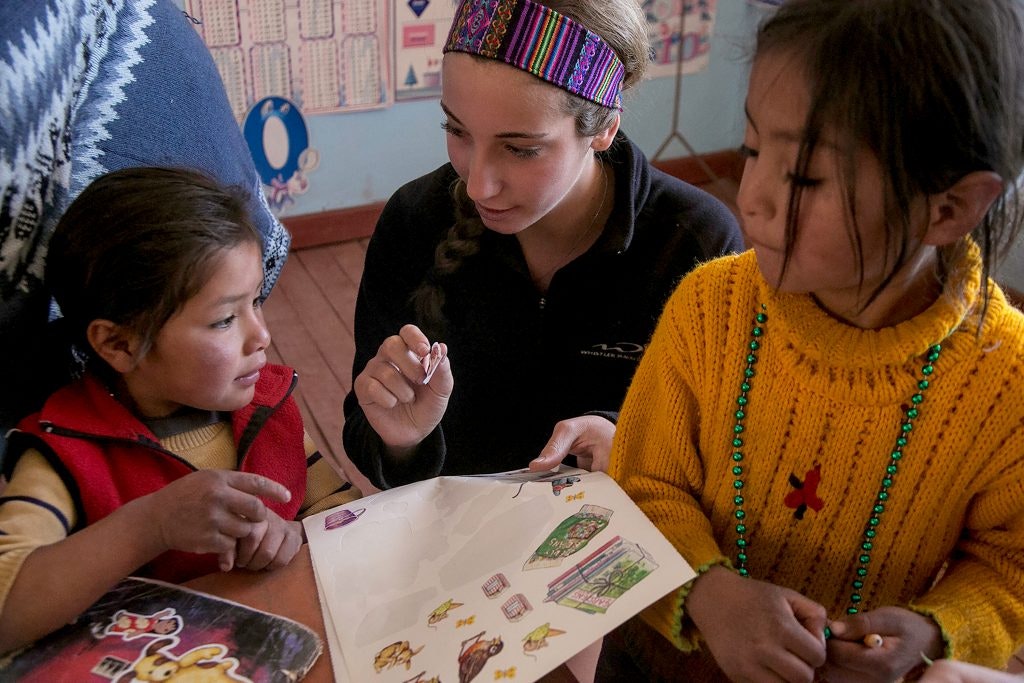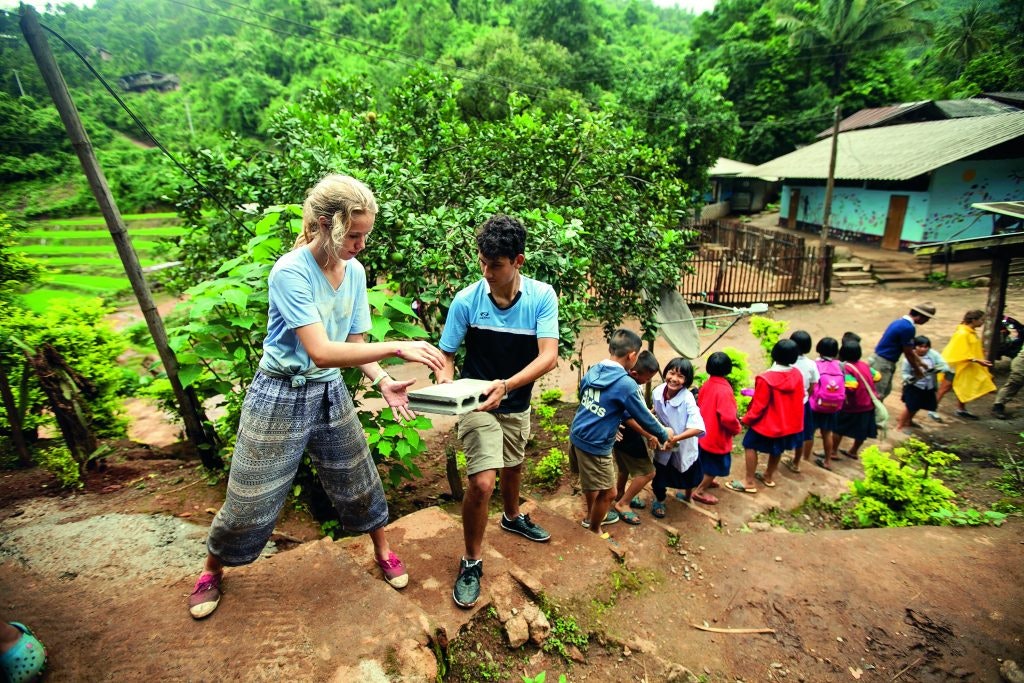Summer offers young people the chance to engage in meaningful volunteer projects during their summer break. High schoolers can focus on personal and professional growth through carefully designed volunteer programs.
Many summer programs allow students to travel and work on impactful volunteer trips. These opportunities range from caring for injured animals to addressing environmental issues like protecting marine life and combating invasive species. Programs cater to teens, providing flexible schedules and affordable program fees.

A Rustic Pathways student reads to a child in Fiji.
When the pandemic happened, trends in volunteering changed. Older people decreased their volunteer work. But the good news is that teens and young adults in Generation Z stepped to fill the gaps left behind.
Once you decide to volunteer, it can be tough to decide which volunteer opportunity is the best for you. It helps to know the difference between meaningful community service and busy work.
Benefits of summer volunteering for High Schoolers
| Benefit | Description |
|---|---|
| Get Ahead of School Obligations | Reduces academic year stress by completing service requirements during summer. |
| Develop Skills | Gain professional skills like public health education, teaching, and sustainable farming. |
| Foster Social Connections | Meet other volunteers, host families, and local community members. |
| Gain Cultural Awareness | Participate in local traditions, food, and events through cultural immersion. |
| Support Local Communities | Work on meaningful projects like health education, conservation, and school infrastructure upgrades. |
Rustic Pathways relies on long-time partnerships to meet these criteria. In countries like Peru, Costa Rica, Fiji and Thailand, local community leaders select projects that best benefit their communities.
How are the volunteer opportunities for High School Students set up?
A project for the Pura Vida Service program in Costa Rica may work like this:
Program Focuses: Infrastructure projects, environmental conservation, and community centers.
- Students contribute to conservation efforts with local organizations like Millón de Árboles.
- Activities include planting trees, improving school facilities, and collaborating with Arenal Volcano National Park.
- Participants can also engage in cultural exchanges with local students.
Minimum Duration: 1 week
Cost: Program fees start with all-inclusive options, including local transportation and airport pickup.

Rustic Pathways students work on an environmental project in Costa Rica.
This process has allowed Rustic Pathways students to make a true difference. In Costa Rica, statistics show the students contributed more than 15,746 hours of service in 2023.
The teens built new storerooms for Matapalo Elementary School and a Uvita community center. They collected 6685 sea turtle eggs to protect threatened and endangered species. And they installed a sidewalk and completed painting projects in the community.
If you’re looking to give back, check out these service programs that have similar projects.
What are the best volunteer programs for this upcoming summer?
Volunteer programs that immerse you in another community are a real win-win option. Here are of the best service programs for that:
Volunteer in Peru: Sacred Valley Service
Program Focuses: Community development and educational projects.
- Teens stay with host families and assist with infrastructure projects in remote villages.
- Service includes planting trees in fire-affected areas, laying water pipes, and supporting local schools.
- Students visit UNESCO World Heritage Sites like Machu Picchu during free time.
Minimum Duration: 1 week
Cost: Includes program fees, airport pick-up, and guided activities.

Donate your time to working with Peruvian youth on meaningful education initiatives. Copyright: © 2014 Rustic Pathways
“In the Sacred Valley program you get a deep bond with the place where you’re doing service,” Ball said. “You see really remote, spectacular subsistence farming communities. The Sacred Valley is a special place and you really get to know the region.”
Volunteer in Thailand: Come with Nothing
Program Focuses: Rural community development and cultural immersion.
- Teens spend 60+ hours volunteering in hill tribe villages.
- Projects involve school infrastructure upgrades, health education, and sustainable farming.
- Students enjoy local cuisine and learn from village elders during cultural exchanges.
Minimum Duration: 2 weeks
Cost: Fees include accommodations and meals.

Rustic Pathways students work on infrastructure projects in Thailand. Credit: Rustic Pathways
These efforts have been ongoing since 2009. Former traveler Maddie Goldberg says working in these communities is quite impactful. She particularly enjoyed interacting with the local villagers during the service projects.
“Although I anticipated this to be a challenge, the Thai children and teachers made me feel completely at home with their endless smiles and welcoming hugs,” Maddie said. “I came to find that no matter how different these countries are, kids are kids. They fill you with joy and are full of joy themselves, no matter where you may travel.”

Take a break from service and climb some dunes in Fiji. Copyright: © 2016 Rustic Pathways
Selecting the right volunteer abroad program
Choosing the best summer volunteer opportunity depends on your interests, location preferences, and program duration. Here’s how to decide:
- Identify Personal Interests: Decide if you prefer wildlife conservation, marine conservation, or educational projects like teaching English.
- Evaluate Program Fees: Consider affordable volunteer opportunities with transparent fees. Ensure the program covers local transportation, accommodations, and airport pickup.
- Check Community Impact: Choose programs that collaborate with local organizations and focus on sustainable outcomes.
- Review Logistics: Assess the availability of host family stays, cultural immersion activities, and the opportunity to travel to UNESCO World Heritage Sites.
- Think Long-Term: Consider how the experience aligns with professional growth, college goals, and building lasting relationships.

